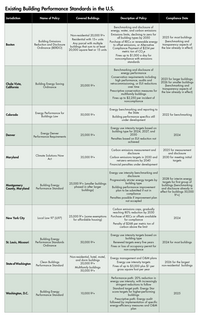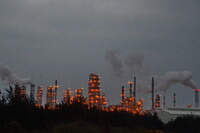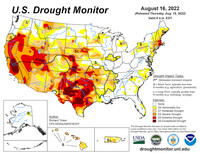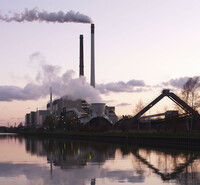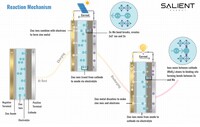News Brief
The ‘Universal Building’ would be able to accommodate new uses as market needs shift, extending building life and minimizing waste.
Like your smartphone, our buildings are reaching obsolescence before the end of their useful lives.
Market needs change on a dime—sometimes faster than a building is constructed. And disruptions can reverse interest in certain building types, as was the case with commercial spaces during the pandemic. These shifts can result in... Read more
Feature
Deep energy retrofits and existing building electrification are critical to curbing carbon emissions. Here’s how to make the case and get it done.
A carbon-neutral city by 2030: that’s the goal of Ithaca, New York’s Green New Deal, adopted in June 2019. We’re not just talking about municipal operations or new building construction, though these are part of the resolution. No, this is about city-wide carbon neutrality, including the electrical grid and privately owned transportation and... Read more
News Brief
Some researchers are trying to debunk the conventional wisdom that transitioning to renewables will cost utilities more.
Far from costing more, investments in grid renewables should provide considerable savings for utilities globally, according to a new analysis published in the journal Joule.
“A rapid green energy transition will likely result in trillions of net savings,” according to the researchers, who add that “... Read more
Explainer
In the world of policy and regulation, the difference between consumptive and non-consumptive water use is like night and day.
As individuals and organizations, we all use water for drinking, washing, and flushing away waste. We install low-flow fixtures (sometimes by regulation) and fix leaks to save water—especially when we’re faced with drought conditions. LEED and other programs give us credit for using less.
But not... Read more
Product Review
Daikin is speeding the transition to lower global warming potential with its Atmosphera ductless heat pumps, which use R32 refrigerants.
Air-source heat pumps are a great alternative to heating and cooling systems that run on fossil fuels. They offer the promise of significantly reducing the carbon footprint of our buildings and speeding our way to all-electric buildings. The challenge with these systems is that their primary refrigerant—R410a—has a global... Read more
News Brief
Environmental activists have stopped permitting of a large petrochemical plant in Louisiana’s “cancer alley,” a rare win for the environment and local communities.
St. James Parish is home to 12 petrochemical plants that make PVC and a number of other plastics. Located in Louisiana’s “cancer alley,” it is also the epicenter of fights over pollution, health, and social justice issues in the area’s historically Black communities. When FG LA L.L.C., an affiliate of Taiwan-based Formosa... Read more
Spotlight Report
“There is no pathway to a zero-emissions building sector without zeroing out emissions from America’s 325 billion square feet of existing buildings,” according to 2018 AIA president Carl Elefante.
But making that transition will be a monumental task. Existing buildings are all over the place in terms of age, condition,... Read more
Webcast
Launched as a pilot program for 2021, the guidelines set a sustainability benchmark and provide uniformity in reporting... Read more
News Brief
The Biden administration is going bigger on embodied carbon by committing to lower emissions from 98% of its construction material purchases. New standards will apply to all federally funded projects.
The U.S. government is vowing to buy lower-carbon construction materials—and to require projects using federal funds to do the same.
Details of the federal government’s so-called Buy Clean Initiative—a program that will require procurement of construction materials that have lower carbon footprints than standard products—are still under... Read more
News Brief
WorldGBC centers green buildings’ impacts on people by aligning with the UN’s Sustainable Development Goals.
The World Green Building Council (WorldGBC) has organized a week of events, September 12 through 16, 2022, broadcasting the ways in which green building supports the United Nations Sustainable Development Goals. The campaign is branded under the hashtag #buildingforeveryone.
Local Green Building Councils are hosting events throughout... Read more
News Brief
With the SIGH Act, New York State is addressing unjust siting of schools near major roadways.
Air pollution near schools negatively affects students’ health and learning. That problem is being addressed in New York State with the SIGH Act (Schools Impacted by Gross Highways), which has passed the State Senate and Assembly, and is waiting to be signed by the governor.
The legislation prohibits... Read more
News Analysis
With a Common Materials Framework soon to be released through Ecomedes, mindful Materials is mapping product labels to industry commitments.
Disclaimer: BuildingGreen is a technical advisory partner to mindful Materials.
Pledging to select building products that support human health is one thing. Figuring out how to do it is another.
Signatories to the A&D Materials Pledge, adopted by The American Institute of Architects (AIA) in November 2020, have yet to commit... Read more
Feature
The tools for conducting a multi-hazard exposure analysis are available if you know where to look.
Updated April 2, 2025; updates by Elene Drosos
Editor’s Note: Alex and Candace also presented a webinar on this topic, now available on demand, with additional CEUs.
The headlines are everywhere—from heat waves in Europe to wildfires in the U.S. to tropical cyclone flooding in Australia. In this age of climate change, just as... Read more
News Brief
By pursuing five circularity principles, project teams can add financial and non-financial value to buildings, says the UK Green Building Council.
Circular economy—a system that relies on regenerative activities instead of on extraction and disposal of finite resources—can help the built environment reduce its carbon footprint, according to the UK Green Building Council (UKGBC). But there’s more: a new report from the group also ties circularity to other positive impacts, including... Read more
News Brief
The Sustainable Development Code now offers guidance on how jurisdictions can address injustice in the built environment.
The Sustainable Development Code (SDC), which offers model ordinances for municipalities wishing to update development codes to be more sustainable, has added a subchapter on social justice. The subchapter, which is still being built out, was added to existing subchapters addressing social issues like affordability, food... Read more
Spotlight Report
The headlines are everywhere—from heat waves in Europe to wildfires in the Western U.S. to tidal flooding in Florida.
In this age of climate change, just as there’s an urgent need to reduce carbon emissions and other greenhouse gasses, we also need to adapt and invest in resilience. Increasingly, owners are asking for risk... Read more
Webcast
How do you demonstrate both environmental and health performance in a meaningful way?
USGBC and IWBI are increasing the alignment between their programs. Knowing how to leverage each in a mutually beneficial way is the key to driving successful integration of a dual certification approach.
LEEDuser’s expert guests, ... Read more
News Analysis
Architects and engineers will be able to claim energy-efficiency tax deductions when working for tax-exempt clients.
The historic Inflation Reduction Act (IRA) recently signed into law is by far the U.S. government’s largest investment in climate change mitigation to date. Not surprisingly, given the outsized influence the building industry has on greenhouse gas emissions, many of the provisions address homes and commercial buildings. Here’s a partial rundown... Read more
News Brief
The Supreme Court recently ruled against EPA, limiting its ability to regulate coal-fired power plants. But the news may not be as dire as it looks.
The Supreme Court recently ruled against EPA, limiting its ability to regulate coal-fired power plants. But the news may not be as dire as it looks.
The U.S. Environmental Protection Agency (EPA) took a blow from the Supreme Court in late June when the court ruled against the Obama-era Clean Power Plan, which would... Read more
Product Review
Salient Energy is developing a zinc-ion battery that avoids some of the safety and supply chain concerns of current lithium-ion systems.
The Holy Grail of energy is for our buildings to go all electric and get that energy from renewable sources. The problem, of course, is what to do when the sun isn’t shining and the wind isn’t blowing. Batteries are the clear answer, and we already have lithium-ion-based systems that work well in electric cars and for building... Read more

